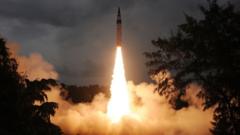In a landscape where military posturing intertwines with nuclear capabilities, the dire stakes of India-Pakistan relations raise critical questions about the potential for catastrophic conflict.
The Nuclear Shadow: Assessing the Risks of India-Pakistan Conflict

The Nuclear Shadow: Assessing the Risks of India-Pakistan Conflict
Tensions simmer as India and Pakistan navigate fraught relations amidst nuclear arsenals.
The recent military standoff between India and Pakistan echoed longstanding tensions in South Asia, reigniting fears of nuclear conflict in a region marked by its precarious stability. While this latest crisis did not escalate into outright warfare thanks to international mediation, it underscored the lurking dangers inherent in both nations—each possessing around 170 nuclear weapons. The situation was reminiscent of a 2019 scientific study that outlined how a terrorist attack could spiral into a nuclear exchange, revealing just how fragile peace can be.
The dynamics of the conflict reveal a complex interplay of military strategy and national pride. India’s Prime Minister Modi recently stated there would be "no tolerance for nuclear blackmail", asserting India’s stance against any nuclear threats while emphasizing proactive military responses to perceived terrorist havens. Meanwhile, Pakistan’s National Command Authority signalled its readiness to maintain control over its nuclear assets, a cautionary reminder of its capabilities and resolve.
Despite their formidable arsenals, experts suggest that the risk of nuclear engagement is relatively constrained under current conditions, especially in the absence of major conventional combat. Historical context plays a role here: past confrontations, such as the Kargil War, demonstrated that both nations have avoided crossing the nuclear threshold, largely due to a mutual understanding of the catastrophic consequences involved.
However, unpredictable human factors—errors, miscommunications, or technological failures—could potentially escalate tensions unexpectedly. An accidental missile incident from India in early 2022 serves as a stark reminder of how quickly a situation can spiral out of control, highlighting the thin line both countries navigate in maintaining their arsenals.
While both India and Pakistan continue to modernize and expand their capabilities, analysts note that neither side desires to be viewed as the first to violate the "nuclear taboo" established post-Hiroshima. This shared understanding of deterrence has, up to now, helped avert disaster, even as both nations bolster their arsenals.
As the geopolitical landscape changes—with fluctuating global dynamics and evolving military strategies—experts warn that the mere presence of nuclear weapons ensures there will always be an inherent risk of conflict escalation. While the immediate dangers may appear manageable, any miscalculation could potentially have catastrophic consequences, reminding the international community of the fragile nature of peace in the region.





















